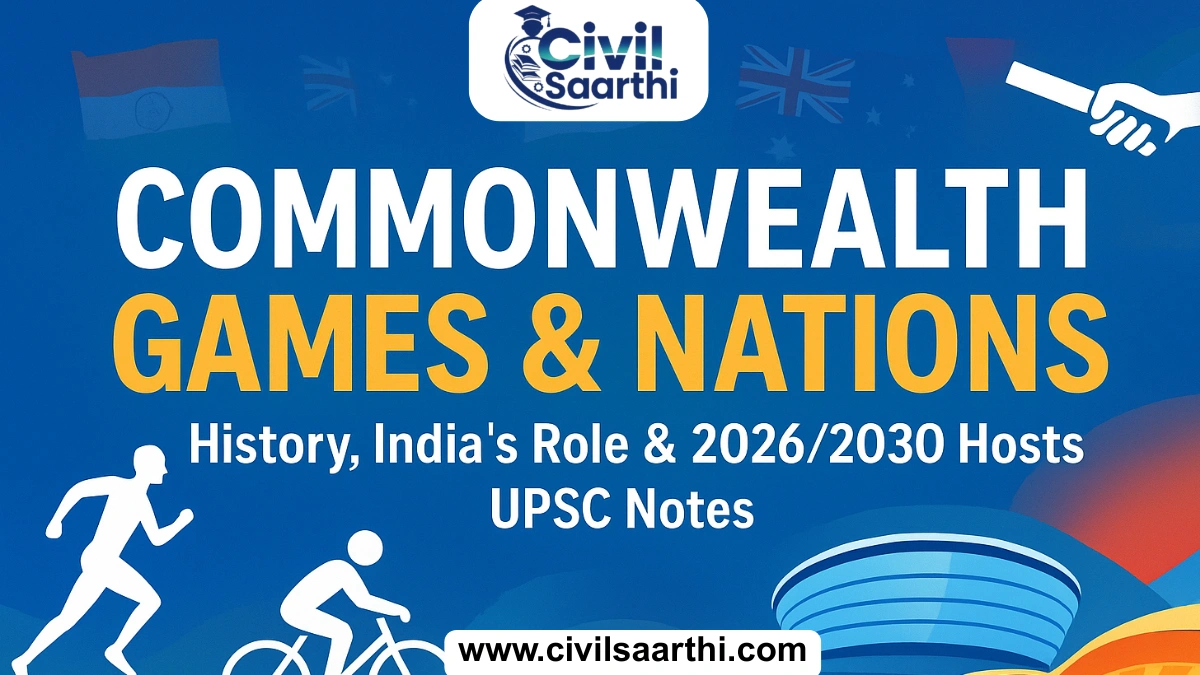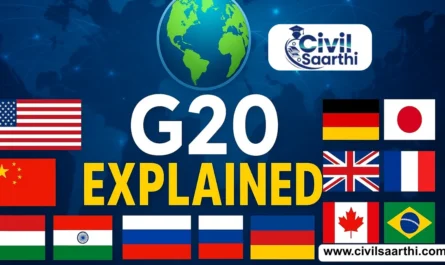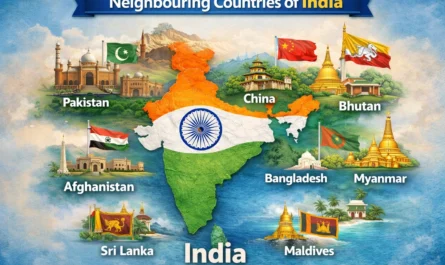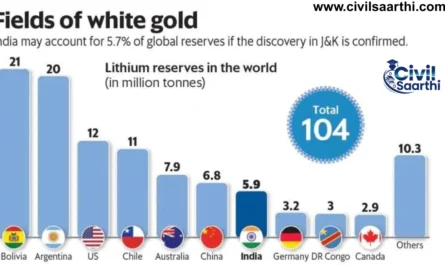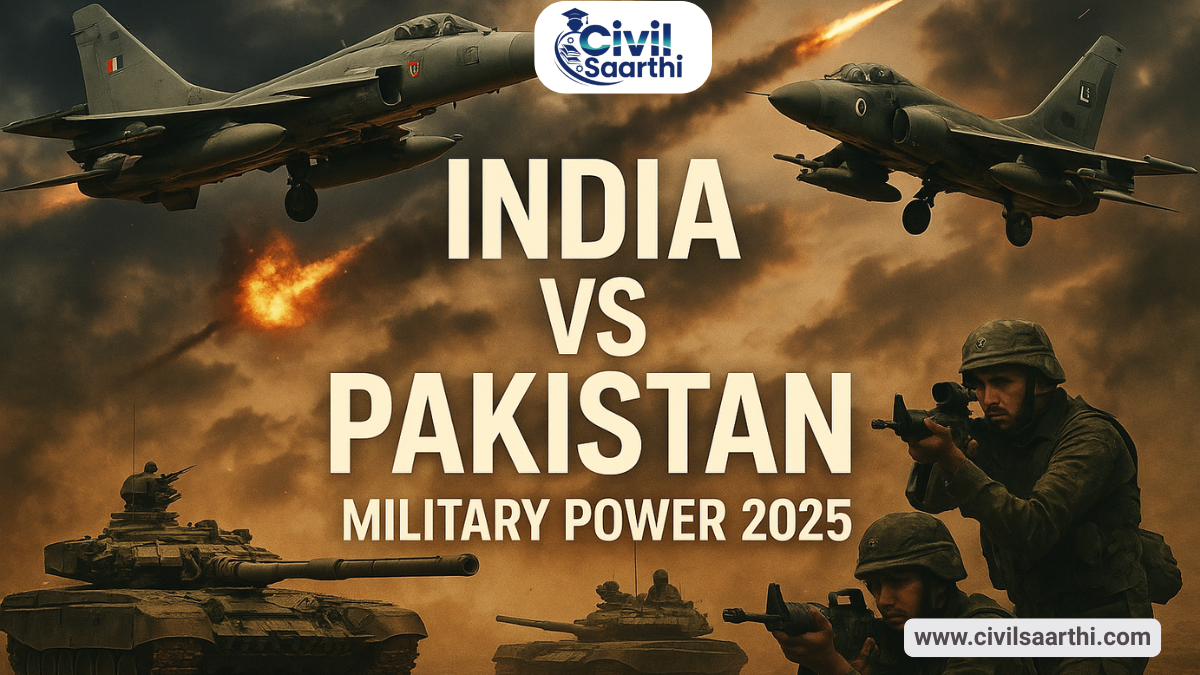The Commonwealth of Nations is a voluntary association of 56 sovereign states which share a legacy of historical linkage with the British Empire but cooperate today on principles of equality, democracy, and development.
The Commonwealth Games are a quadrennial multi-sport event among Commonwealth members, meant to foster unity, sportsmanship, and cultural exchange. The 2030 edition, to be hosted in Ahmedabad, India (recommended), will commemorate a centenary since the first Games in 1930.
Historical Evolution of the Commonwealth
The Commonwealth originated from the political transformation of the British Empire into an association of equal, autonomous nations. Over time, it redefined itself from imperial control to partnership based on shared values.
- 1926 – Balfour Declaration: Recognized Dominions as autonomous communities equal in status.
- 1931 – Statute of Westminster: Gave full legislative sovereignty to Dominions.
- 1949 – London Declaration: Allowed republics to remain in the Commonwealth, establishing the monarch as symbolic head.
- 1965 onwards – Secretariat & expansion: Creation of the Commonwealth Secretariat; membership extended beyond former colonies (e.g. Mozambique, Rwanda, Gabon, Togo).
Membership & Demographics
The Commonwealth spans five continents, representing a wide variety of cultures, economies, and populations. It has become one of the largest multilateral bodies by population and diversity.
- Total Members: 56 countries.
- Recent Additions: Gabon and Togo joined in 2022.
- Population Covered: Approximately 2.7 billion people.
- Youth Majority: Over 60% of population under age 30.
- Regional Spread: Africa (21), Asia (8), Americas & Caribbean (13), Europe (3), Pacific/Oceania (11).
Objectives & Core Principles
The Commonwealth rests on a set of shared values: democracy, human rights, rule of law, sustainable development, and cooperation among members.
- Strengthen democracy, rule of law, and good governance.
- Promote human rights, gender equality, and social justice.
- Facilitate economic development, trade cooperation, and capacity building.
- Support education, youth empowerment, and cultural exchange.
- Assist small states and vulnerable members, especially in climate resilience.
Institutional Architecture
The Commonwealth does not have a binding constitution; instead, its structure is flexible, relying on consensus, declarations, and programmatic engagement through a modest institutional setup.
- Head of the Commonwealth: A ceremonial, symbolic role (currently the British monarch).
- Commonwealth Secretariat: The main administrative and coordination body located in London.
- CHOGM (Heads of Government Meeting): Held every two years to decide strategic direction.
- Board of Governors / Ministerial meetings / CMAG: Oversight and accountability bodies, especially CMAG for democracy norms.
- Specialized Agencies / Programs:
• Commonwealth Fund for Technical Cooperation (CFTC)
• Commonwealth Foundation (civil society)
• Commonwealth of Learning (education)
• Climate Finance Access Hub, Blue Charter, youth initiatives
India’s Role in the Commonwealth
India is one of the most influential members of the Commonwealth, balancing its status as a large democracy and developing nation with active engagement in shaping Commonwealth policy.
- Became a member in 1949 as a republic first country to do so.
- Hosted CHOGM in 1983 (New Delhi).
- Major contributor to CFTC and other technical cooperation programs.
- Advocates issues of climate justice, trade fairness, and global south voice.
- Participated actively in anti-apartheid diplomacy and capacity building in other member states.
The Commonwealth Games: Overview & Purpose
The Commonwealth Games are the sporting manifestation of the Commonwealth’s ideals, bringing together athletes from member nations in friendly competition and cultural exchange.
- Inaugural Year: 1930, in Hamilton, Canada.
- Frequency: Every 4 years.
- Organizer: Commonwealth Games Federation (CGF).
- Motto / Values: Emphasis on humanity, equality, and destiny.
- Inclusion: Integrates para-sports within the program.
Objectives of the Commonwealth Games
While primarily a sports event, the Commonwealth Games are designed with broader diplomatic and social objectives in mind.
- Foster peace, friendship, and mutual respect across nations.
- Promote sports participation and talent development, especially among youth.
- Encourage gender parity and inclusion via integrated programs.
- Enhance host nation infrastructure and legacy for future use.
- Provide a stage for cultural display and soft diplomacy among Commonwealth nations.
List of All Commonwealth Games (1930–2030)
This table captures the trajectory and diversity of the Commonwealth Games, from its modest beginnings to large-scale modern events. The 2026 edition Glasgow stepping in is unique in modulating scale and program to suit financial and logistical realities, showing adaptability of the Games structure.
| Year | Host City | Host Country | Key Highlights / Notes |
|---|---|---|---|
| 1930 | Hamilton | Canada | First “British Empire Games,” 11 nations competed |
| 1934 | London | UK | Women’s events introduced |
| 1938 | Sydney | Australia | Last pre-WWII edition |
| 1950 | Auckland | New Zealand | Games resumed post-WWII |
| 1954 | Vancouver | Canada | “Miracle Mile” race (Bannister vs Landy) |
| 1958 | Cardiff | Wales | Queen’s Baton Relay begins |
| 1962 | Perth | Australia | Participation expanded to 35 nations |
| 1966 | Kingston | Jamaica | First Games in the Caribbean |
| 1970 | Edinburgh | Scotland | Introduction of metric measurements |
| 1974 | Christchurch | New Zealand | Emphasis on “Sport for All” |
| 1978 | Edmonton | Canada | Retitled “Commonwealth Games” |
| 1982 | Brisbane | Australia | India wins first swimming medal |
| 1986 | Edinburgh | Scotland | Boycotts by African nations over apartheid |
| 1990 | Auckland | New Zealand | 55 nations competed |
| 1994 | Victoria | Canada | Para-sport officially included |
| 1998 | Kuala Lumpur | Malaysia | First Asian host; cricket included |
| 2002 | Manchester | UK | First “Manchester model” of compact hosting |
| 2006 | Melbourne | Australia | 71 nations took part |
| 2010 | New Delhi | India | India’s best haul: 101 medals |
| 2014 | Glasgow | Scotland | Innovation in sustainability and legacy |
| 2018 | Gold Coast | Australia | First gender-balanced Games |
| 2022 | Birmingham | UK | 72 teams; India ranked 4th |
| 2026 | Glasgow | Scotland | Re-host after Victoria withdrew (see next section) |
| 2030* | Ahmedabad | India | Proposed centenary edition |
India’s Performance Over Recent Editions
India’s consistency at the Commonwealth Games demonstrates its evolving strengths in sports like weightlifting, wrestling, shooting, badminton, and table tennis. The 2010 Games remain a landmark performance, and India continues to maintain a top-tier standing among Commonwealth nations.
| Edition | Host | India’s Rank | Gold | Silver | Bronze | Total Medals |
|---|---|---|---|---|---|---|
| 2010 | New Delhi | 2 | 38 | 27 | 36 | 101 |
| 2014 | Glasgow | 5 | 15 | 30 | 19 | 64 |
| 2018 | Gold Coast | 3 | 26 | 20 | 20 | 66 |
| 2022 | Birmingham | 4 | 22 | 16 | 23 | 61 |
2026 Commonwealth Games: Host & Key Features
Originally awarded to Victoria, Australia, the 2026 Commonwealth Games lost its host when the Victorian government withdrew in 2023 due to massive cost escalations. Subsequently, Glasgow, Scotland agreed to take over as host, staging a scaled-down version of the Games from 23 July to 2 August 2026. This decision was formalized by the Commonwealth Games Federation in late 2024.paralympic.org
- Program Reduction: Only 10 sports will be included, with six para-sport disciplines fully integrated
- Venues: Four venues located close to each other Scotstoun Stadium, Tollcross Swimming Centre, Emirates Arena / Sir Chris Hoy Velodrome, and Scottish Event Campus (SEC).
- Para Sports: A record 47 medal events in para disciplines will be contested across six para sports, the most extensive in the history of the Games.
- Return of Historical Events: The Commonwealth Mile (last held in 1966) will make a comeback in athletics.
- “Lighter and Leaner” Model: The 2026 Games are deliberately designed to be cost-effective, minimizing new infrastructure by relying heavily on existing venues and financial support from CGF to reduce burden on public funds.
Significance of Hosting 2030 in Ahmedabad
Hosting the 2030 centenary Commonwealth Games in Ahmedabad would be a watershed moment for India’s sports diplomacy and global image.
- Centenary Celebration: 100 years since the first Games in 1930, symbolizing continuity and legacy.
- Infrastructure Boost: Investment in stadiums, athlete villages, city transport, and public amenities.
- Soft Power Projection: Reinforces India’s leadership in the Commonwealth and global sports hosting.
- Legacy Use: Facilities built can serve future sports programs, youth development, and international bids (e.g., Olympics).
- Economic & Social Impact: Tourism, employment, and regional development bolstered by global attention.
Challenges & Critiques
Both the Commonwealth as a body and its flagship Games face modern constraints and criticisms that must be addressed for future relevance.
- Legacy of Colonialism: The Commonwealth is sometimes critiqued as a post-imperial relic.
- Unequal Development: Wide disparities between affluent and struggling member states.
- Enforcement Weakness: Lack of binding power to enforce democratic norms.
- Financial Strain: Many potential hosts balk at hosting costs, leading to withdrawals (e.g., Victoria).
- Relevance Questioned: Some member states see limited benefits or prioritise other alliances.
- Games-specific Issues: Overruns, infrastructure debt, doping, declining participation from major sports.
Relevance for UPSC Aspirants
Understanding the Commonwealth and the Games intersects with key UPSC themes: multilateral institutions, India’s external relations, sports policy, governance, and development.
- Appears in GS Paper 2: India and multilateral institutions, foreign policy.
- In GS Paper 3: infrastructure, sports economy, urban development, youth.
- Makes good content for Essay / Ethics: values, cooperation, sports integrity.
- Prelims: key facts, years, hosts, membership, institutional bodies, host proposals.
Way Forward & Proposed Reforms
The future of the Commonwealth lies not in nostalgia but in relevance aligning with global priorities, enabling equitable growth, and showcasing adaptability through more inclusive and sustainable sporting events.
Proposals (points):
- Deepen intra-Commonwealth trade and digital cooperation.
- Expand climate finance access, particularly for small island and vulnerable states.
- Scale up youth, education, and digital skill initiatives.
- Enhance governance accountability within Commonwealth bodies.
- Reimagine the Games model: leaner, sustainable, and hostable by more nations.
Conclusion
The Commonwealth has transitioned from a colonial legacy to a platform for cooperation rooted in shared values. The Commonwealth Games are a tangible expression of cultural, social, and diplomatic unity through sports.
The 2026 Glasgow edition will test the viability of a leaner model, while the 2030 Ahmedabad bid presents India with an opportunity to elevate its global standing. For UPSC aspirants, this topic offers a rich blend of historical facts, policy analysis, and future vision.

